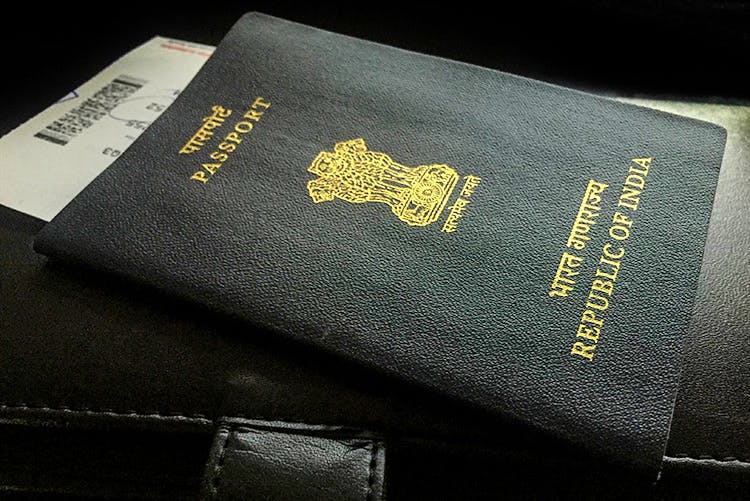Skyscanner helped us pen down our guide to one of the most essential parts of travelling: The Passport. Here’s how you can learn how to get one, renew one, and what to do in case you end up losing one. A trip overseas will remain a distant dream until you have the most important personal identification documents with you, and we’re here to solve those problems.
LBB's Handy Guide To Passports: Get It, Renew It, & Don't Lose It
Get It
Passport applications have always been regarded as an inconvenient and long drawn-out process. It is recommended that you apply for your passport at least two-three months prior to your date of travel. Here’s the step-by-step process to get your passport:
Step 1
The Indian Government has a specific website where one can apply online for a passport. Log on to PassportIndia to get started. You will need to register here and create an account to move forward with your application.
Step 2
You may then click on the link ‘Apply for fresh passport/re-issue of passport’.
Step 3
Fill in the required details in the form and submit.
Step 4
You will then need to click the “Pay and Schedule Appointment” link on the “View Saved/Submitted Applications” screen.
Step 5
It’s important to then print your application receipt, which will contain your application reference or appointment number. You will need to furnish this document during your meeting with the passport official.
Step 6
The next step would be to visit the Regional Passport Office, to enable the Passport Issuing Authority to obtain your photographs and biometrics, who will then grant you their decision.
Step 7
Thereafter, the passport will be delivered by post to your registered address. It’s important to note that the passport will not be handed over to anyone but you.
For further details and FAQs regarding this process, log on to their website.
Renew It
It’s important to understand that some passports may not be valid for travel to certain countries. Renewal of your passport needs to be done well in advance. If your passport has less than six months on the clock, a number of countries may not let you in. For other countries, that duration is between one and three months. So if your passport is due to expire, check with the tourist board information of the country you are visiting.
Another reason you may not gain entry to a country is due to the number of blank pages you have left on your passport. Some countries require a minimum of three blank pages upon entry, and with the size of passport stamps increasing {some in the form of stickers covering an entire page}, this could cause a problem.
#LBBTip: Passports are never filled front to back, so be sure to periodically check your passport to count the number of blank pages. The process of passport renewal will be the same as applying for a new one, starting with the online registration.
If You Lose It
While meticulous planning can ensure smooth travel, there is always potential for the unexpected to happen. Losing your passport can turn the dream vacation into a nightmare.
Seek Help From The Local Police
Make your way to the nearest police station and report the incident as quickly as possible. If your passport has been stolen, you’re going to need a police report, which is also the first thing your travel insurance provider will ask for. Remember to keep a hold of the original copy, though.
Always Keep Colour Copies Of All Important Documents
Scan them, store them on your phone, or email them to yourself. Showing local authorities copies of your documents can make explaining your situation a lot easier, especially if there’s a language barrier.
Carry The High Commission’s Contact Details
They even answer phones on the weekend! After you’ve reported your loss with local authorities, the next logical step is to call the Indian High Commission. There are two options, the first one being the ‘Emergency Exit’, which just refers to the High Commission arranging for you to immediately leave the country. The second is to arrange an emergency or temporary passport, which will require you to wait until the next working day and visit the High Commission in person.
Choose Wisely Between The Two Options
When helpful High Commission officials offer an Emergency Exit, it sounds very efficient and fancy, but in reality, it’s like being deported from a country. You’re given temporary papers and put on the next flight home. What you might not realize is, if you take this option once you’ve been deported from a country, it will always show up on your record, and you will have to explain it every time you travel or apply for a visa.
The High Commissioner’s office will fill out a Tatkal form, and may also waive the Tatkal fee, which is quite a pretty packet in Euros.
Know Where You Stand With Visas
Finally, armed with the new passport, you will have to head to the Home Office, since new passport means no visa stamps, as a Schengen visa can only be issued to you from your home country. All the Home Office can give you is the guest country’s visa, which might take some time.
Be Extra Careful
We know no one plans for things to get stolen or lost, but being extra careful with this one document could save you from more stress during vacations. Invest in a travel belt to keep important and valuable items close to you.

